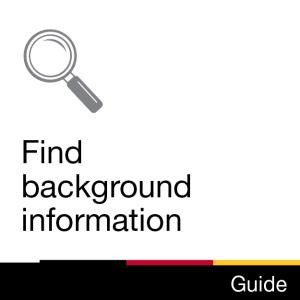Time commitment
Less than 2 minutes
Description
Why use reference sources? Watch this video to learn about the benefits of reference sources before you begin your research.
Video
Transcript
Reference sources, such as encyclopedias, textbooks, and dictionaries, can serve as helpful tools in the research process.
Here are 5 specific reasons to use them.
One: answer your basic questions.
When you're starting to research a new topic, it's good to begin by exploring the basics of the topic through simple WHO, WHAT, WHEN, WHERE, and WHY questions.
Reference sources are designed to provide overviews on topics and are therefore well-suited to providing answers to these types of questions, whether it be biographical details for a historical figure or a summary of the relevance of a specific event.
Two: test your assumptions.
When starting your research, you may already know a little bit about your topic. The brief overviews provided in reference sources are great places to test these assumptions. This might mean confirming the key points in a definition or verifying the key dates related to an event you are researching.
Three: identify keywords for your searches.
Different authors use different words to talk about the same topic — and some of these words may not be intuitive. For example, if you're researching Martin Luther King, Jr's anti-poverty work for the first time, you may not think to use the words "economic justice" to find relevant material.
Reference sources can help you identify these specialized keywords — and this, in turn, can help you with your searching.
[The Omni advanced search screen is shown with the search “economic justice” and “civil rights” entered into the search boxes]
Four: narrow your topic.
In addition to providing basic details, articles in reference sources often highlight the important aspects of a topic's significance.
An article on Black civil right movements, for instance, may discuss civil rights as an example of broader struggles against racism, as well as summarizing the relationship of civil rights struggles to anti-poverty work and to activism against war.
By highlighting various important angles of a topic, reference sources provide options for narrowing the focus of your research.
[Two options for topics are shown: activism against war and anti-poverty work. One topic disappears to signify the decision to focus the paper on anti-poverty work]
Five: find more detailed sources.
Articles in reference sources may cite significant writers on your topic.
[A magnifying glass containing enlarged text is shown, signify that an article shown has mentioned the author Michael Klarman]
They [articles in reference sources] sometimes even have their own bibliographies that can direct you to more in-depth and critical secondary sources like books and journal articles.
In sum, while they may not provide in-depth analysis, the summaries provided in reference sources can help get your research moving when you're just getting started or when you find yourself stuck.
Finally, keep in mind that it's important to check with your instructor if you are unclear on which types of sources they expect you to include in your assignment.
For a more in-depth look at finding and using reference sources, check out our background information guide at guides.lib.uoguelph.ca/BackgroundInformation.
And if you have any other questions, just ask us.
[lib.uoguelph.ca]
[Twitter/Instagram: @uglibrary Facebook: /McLaughlinLibrary
[YouTube: /UoGLibrary]
[This work is licensed under a Creative Commons Attribution-NonCommercial-ShareAlike 4.0 International License.] For more information about our services, and what we're offering this semester, visit our website: www.lib.uoguelph.ca.
License

This work is licensed under a Creative Commons Attribution-NonCommercial-ShareAlike 4.0 International License.
Recommended
- Ask Chat is a collaborative service
- Ask Us Online Chat hours
- Contact Us

